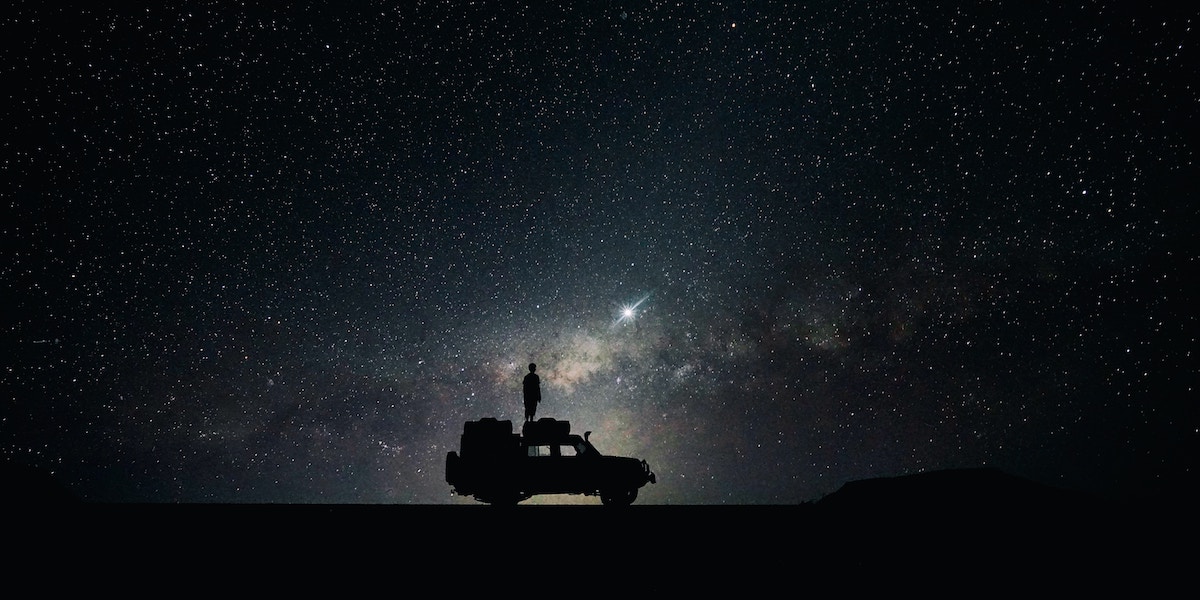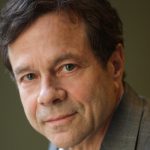Alan Lightman is a physicist, novelist, and essayist who was the first person to receive a dual faculty appointment in science and the humanities at MIT. He received his PhD in theoretical physics from the California Institute of Technology, and is the author of the internationally acclaimed Einstein’s Dreams, which has been translated into thirty languages around the world. He recently sat down with Heleo Associate Editor Jeremy Price to talk about science, spirituality, and the deepest insights from his latest book, Searching for Stars on an Island in Maine.
This conversation has been edited and condensed. To watch the full version, click the video below.
Jeremy: What I loved about this book is that, like so much of your work, it’s insightful about a whole range of truths. You talk about human connection and love, but then it’s also contextualized within the huge scope of the universe. So what were you trying to accomplish with this book, and what does it mean to you?
Alan: Well, I’ve been interested for many years in the dialogue between science and religion, and what constantly fascinates me is that no matter what new advances science makes, there is still room for religion. I think that science and religion have been the two greatest forces that have shaped human civilization, so I wanted to write about the conversation between [them], the different ways they look at the world, the different beliefs they have, and how they arrive at those beliefs.
It’s such a weighty subject, so I decided to examine the subject as a meditation and root it in a place in the same way that Henry David Thoreau wrote Walden at Walden Pond.
Jeremy: You kick off the book with this really astonishing anecdote. I was wondering if you could share it with us.
Alan: My wife is a painter, and we’ve been spending our summers on an island in Maine [where] she paints. It’s a small island, only about 30 acres. There are no roads or bridges to the island and no ferry service, so everybody has their own boat.
One night some years ago, I was coming back to the island in my boat late at night. It was a very clear night, and the stars were bristling in the sky. I turned off the engine, lay down in the boat, and looked up at the sky—and I felt like I was falling into infinity. I felt like I was merging with something much larger than myself. I felt that all of time, from the distant past to the distant future, was compressed to a dot, and that I was connected to something permanent and ethereal.
So that’s the experience that I had, and it conflicted with my understanding of the world as a completely material place, which is, of course, the scientific view. So the rest of the book is working out that conflict—not coming to any conclusions or resolution, but just exploring that interesting conflict between the material and the immaterial.
“No matter what new advances science makes, there is still room for religion.”
Human beings have struggled between the material and the immaterial for centuries. We’ve learned through modern science that everything material passes away—atoms, even stars burn up their nuclear fuel—but we long for something that’s permanent, something immaterial.
Jeremy: I was struck in a similar fashion when I read this, because I’ve always had a very scientific view of the world myself, and yet there are so many things that don’t have easy scientific answers. And if anything, I’m grateful for that.
In fact, at [one point in the book,] you talk about what happened before the Big Bang, and how that’s almost an impossible question to ask. You have this incredible quote where you say, “The most profound questions seem to have this fascinating aspect: Either they have no answer at all, or all possible answers seem impossible.”
I thought that was just brilliant, because that insight seems so relevant to so many human dramas and human struggles. Like, “Why did I fall in love with this person instead of that person?”
Alan: I totally agree with you. I think that science will never be able to give a full explanation of human emotions, and like you, I’m glad that it never does. I don’t want a computer to be able to paint the Mona Lisa. I don’t want a computer to do matchmaking between me and some girlfriend. And going back to that night when I looked up at the stars and felt that transcendent experience, I think that if you connected every one of my hundred billion neurons to a computer and read out all of the electrical impulses, you still would not have understood the feeling that I had.
Jeremy: Right. And there is something comforting about that.
Alan: We don’t want to be reduced to just numbers.

Jeremy: One part that really struck me was your story about how you had been wrestling with a physics problem for months and months, and then suddenly one morning at 5 AM, you woke up, and you had this feeling of being connected to something larger than yourself. And just like that, the answer was there.
With a lot of these transcendent experiences, I think it might be tempting for your average materialist to say, “Well, that’s just a trick of the brain. It doesn’t really mean anything.” And yet here you are, and here are lots of other scientists, saying, “Well no, these transcendent experiences actually do lead me to an important truth.” So it seems like there is a legitimacy to them that isn’t just illusory.
Alan: I agree. I think of the transcendent experience as [being] closely related to the creative process, and the creative process is something that we don’t really understand. We don’t know how the subconscious mind works, we really don’t know everything that’s going on there. One of the quotations from Einstein that I love the most is, “The most beautiful experience we can have is the mysterious. It lies at the cradle of true science and true art.” I love that, that the super-rationalist Albert Einstein, the symbol of the scientific mind, honors the mysterious.
Jeremy: Switching gears slightly, in the book you talk about how when Galileo was making some of his first discoveries, he noticed that, “Hey, the moon has craters on it.” All these celestial bodies that were once thought to be perfect were actually very imperfect, just like the Earth.
When he first presented these findings to the world, a lot of people totally rejected them, because it was such a dramatic shift of their worldview. They were like, “What do you mean, the stars aren’t perfect?” That was a deeply disturbing [thought] to them, so they decided to not even engage with the idea. At some points, they would refuse to even look into his telescope.
“The most beautiful experience we can have is the mysterious. It lies at the cradle of true science and true art.”
That really reminded me of climate change nowadays, and how there is this tough, disturbing truth that we need to confront, and yet many people are not willing to do so. I was wondering if you had any reflections on that connection, and how we can encourage people to look into the telescope, so to speak.
Alan: There’s a sociological [finding] that over history, people don’t worry about things that are far off in the future. When Mt. Vesuvius destroyed Pompeii, it erupted a number of times. People would wait about 20 years, and [then] they would start building their houses on the mountainside again. People keep building their houses in California on the San Andreas Fault because they figure the danger is too far into the future. And this is also why a lot of young people smoke cigarettes, because if you tell them, “It’s going to cut five years off your life when you’re 75,” they’re not worried about that, because it’s so far in the future.
We have a psychological inclination towards the immediate and the now, and I think that’s one of the reasons why it’s hard to convince people about climate change. Of course, there are the political issues. There are the business issues that, at least in the short-run, it costs money to make factories reduce their carbon footprint. [But] China has figured out that in the long-run, it’s going to save money to be environmentally responsible. China always thinks in terms of centuries, but we in the US think in the short-term.
I hate to say this, but I think it’s going to take more climate disasters to convince people that this is a real problem. You’ve got top scientists at the National Academy of Sciences who say that there’s no question that human beings are causing climate change, and at some point, we will have gone past the point of no return. But I don’t think it’s going to register with most of the public until we have more episodes like Hurricane Katrina.
Jeremy: There’s an analogy I heard once: If you stick a frog in a pot of water that’s already boiling, the frog will jump out, because the immediacy of that hot water will cause it to freak out. But if you stick a frog in a pot of water and then very slowly warm it up, the frog just stays put. And it dies, because the urgency isn’t quite there, and it doesn’t fully realize what’s happening.

Alan: I love that analogy. And just to complete it, if you had a scientist frog who came and told the first frog in the pot of slowly warming water, “I’ve done some theoretical calculations, and in three years, this water’s going to be so hot that it’s going to kill you,” the first frog would say, “Oh, go back to your calculations. I’m having a good time.”
Jeremy: Right, right… “The water’s fine!”
Alan: “Got a bottle of wine in here…”
Jeremy: I wish that analogy wasn’t so perfect, and yet it is.
Bringing things back to the book for a second, I thought it was really interesting when you were talking about the relationship between meaning and permanence, and how in your view, as with so many other people, it seems that something can only be meaningful if it really sticks around—either for an eternity, or at least for a very long time. I can totally see that, especially when we think about our own lives: “Does my life mean anything if I’m going to die one day?”
And yet on the flip side, I’ve found that the opposite can be true as well. I live in New York City—let’s say I’m on the subway, and I exchange a friendly smile with a busker playing music on the platform. To me, the simplicity and the purity of that moment, that little moment of human connection, is so meaningful. And I would almost feel like that meaning would be tainted if that person and I became friends, and then we slowly and painfully grew apart. I would almost rather have just that simple, momentary connection. So I was wondering if you had any reflections on that.
Alan: I totally agree with you that that moment between you and the musician is meaningful. But I’m a lot older than you are, and I’m beginning to see the full arc, the full trajectory of my life. And I have a tendency to think that for my life to have meaning, I have to have done things that last a long time. It’s true that those moments, seeing that musician playing on the platform, are very pleasurable, but when I think of my life as a whole, I think about, “What have I done that will last?”
And the conclusion that I’ve come to is that it’s futile to think that way, because really, nothing lasts. I have two grandchildren now, a third one on the way, and they will remember me. Their children might have pictures of me and might know something about me. But [by] the time you get to great-great-grandchildren, which might be 75 years or 100 years from now, there will be very little trace of me. By the time you get to 500 or 1,000 years, nothing that I do will be around. So the belief that for something to have meaning, it has to last a long time—it’s a futile aspiration.
So if you’re trying to make meaning of your life, what are you left with? I think you’re left with your encounter with the musician on the platform.

Jeremy: It reminds me of a line from Walt Whitman where he says, “The powerful play goes on, and you may contribute a verse.” To me, that makes the impermanence of one’s life just a little bit easier to swallow. When you contextualize your life within this larger ecosystem of the universe, when you bring your focus back a little bit, maybe it’s a little easier to see that there’s a whole play going on around you, and there always will be—and you can contribute that verse.
I’ve got one last question for you. Again, what I love about this book is that you have a way of bringing the human drama into this larger, universal context. And yet at the very end, you talk about looking out over the water, and [seeing] this heron fly across the bay. That was so moving to me, because after thinking so hard about what it is to be human, at the end of the day, it seems like what matters most is just appreciating the moment. So for you, what do you find most meaningful in life?
Alan: That’s a heavy question, and of course I can’t fully answer it. But I can say that my older daughter has two children, ages five and one-and-a-half. They’re coming from New York to visit me on the island later today, and they’re going to be here for a few days. I’m going to take the five-year-old kayaking, and pick up shells with the younger one. I’m really looking forward to that.
Are you fascinated by big ideas? Then come check out the Next Big Idea Club, a next-generation book club curated by world-renowned thinkers Malcolm Gladwell, Susan Cain, Adam Grant, and Daniel Pink. Start your 2-week free trial now!




























